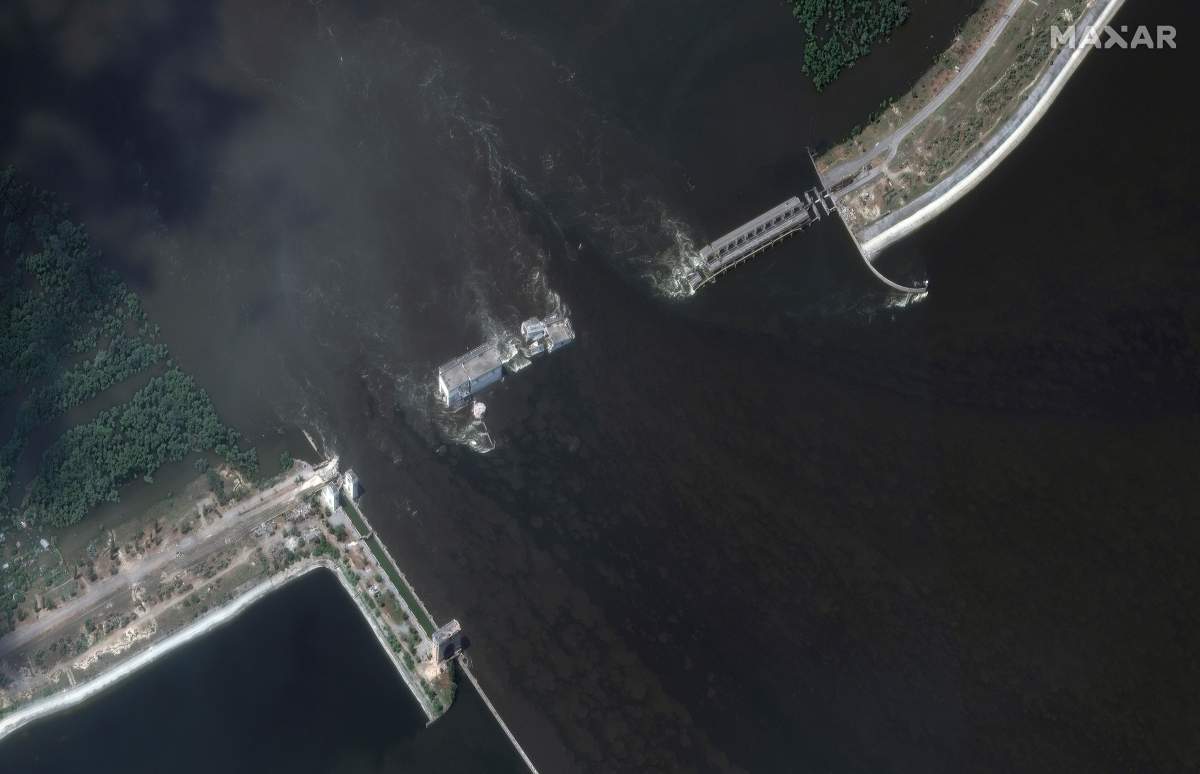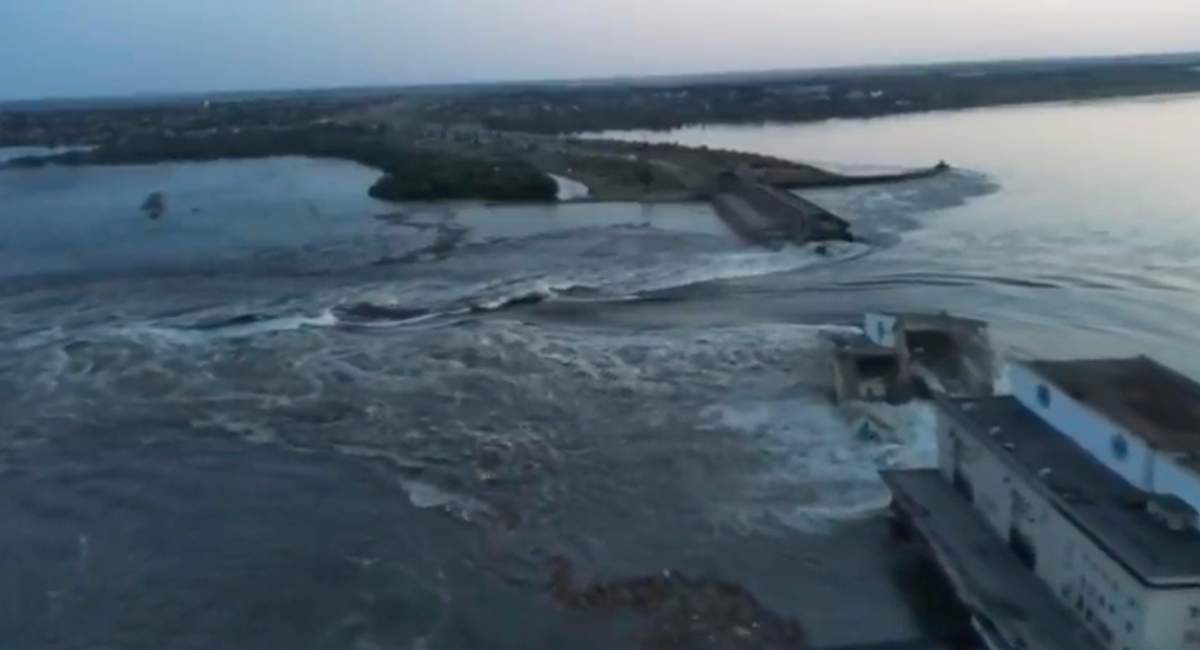Ukrainian officials are warning the country could face “years” of damage due to the destruction of the Kakhovka dam last week.

Ukraine and Russia have blamed each other for blast, which has resulted in flooding that has destroyed towns, claimed lives and ruined drinking water and irrigation systems.
Ukraine and the International Criminal Court have been investigating alleged war crimes since the full-scale conflict began on Feb. 24, 2022, and international law experts suggest another violation may have been committed with the dam’s destruction.

“It seems clear to me that this was a significant structure that was not blown up by accident,” said Chris Waters, a professor with the faculty of law at the University of Windsor.
“International humanitarian law prohibits causing damage to the environment, which is widespread, severe and long term, and it’s pretty clear that this attack and the forces it’s released have will have widespread long term and severe consequences.”
Russia blew up dam to prevent southern offensive: Ukraine
The Kakhovka dam on the Dnieper River was destroyed on June 6.
It lies in a part of the Kherson region occupied by Moscow’s forces for the past year. Ukraine holds the western bank of the Dnieper, while Russia controls the eastern side, which is lower and more vulnerable to flooding.
Ukraine Deputy Defence Minister Hanna Malier alleged that Russia blew up the dam to prevent Kyiv’s troops from advancing in the southern Kherson region. Ukrainian officials confirmed over the weekend its long-awaited counteroffensive had begun.

Ukraine has accused Russian forces of blowing up the dam from inside its associated hydroelectric power station. Moscow has blamed the destruction of the dam on Kyiv.
Malier said the action was also aimed at helping allow the deployment of Russian reserves to the Zaporizhzhia and Bakhmut areas.
Ukraine’s security service said it had intercepted a phone call allegedly claiming a Russian “sabotage group” blew up the hydroelectric station and dam.
Norway’s research foundation NORSAR said that data collected from regional seismic stations showed clear signals of an explosion, while U.S. spy satellites detected an explosion at the dam, a U.S. official told The New York Times.
Is blowing up the dam a war crime?
The 1949 Geneva Convention’s subsequent protocols specifically cover attacks on “installations containing dangerous forces,” such as hydroelectric dams.

Get daily National news
There is no mention of dams in the 1998 founding statute of the International Criminal Court, but it does prohibit “intentionally launching an attack in the knowledge that such attack will cause incidental loss of life or injury to civilians or damage to civilian objects or widespread, long-term and severe damage to the natural environment, which would be clearly excessive in relation to the concrete and direct overall military advantage anticipated.”

Claude Emanuelli, a former professor with the faculty of law at the University of Ottawa and author of the ebook, The War in Ukraine and the Law, told Global News it’s not clear-cut whether the dam’s destruction is a war crime.
“Yes, a basic idea is that it’s probably a war crime, but it’s not enough to just decide it like this. It has to be looked into carefully,” he said.
Emanuelli said international law contains a “condition,” which is that the consequences must be “excessive” in relation to the military advantage anticipated by the attackers.
“That’s an important element in our case because the Russians — provided they are responsible for the attack — could very well argue that whatever the consequences of destroying the dam are, they are not excessive to the military advantage that they anticipated,” he said, adding that advantage may be to shorten the front lines and prevent any Ukrainian attacks in the delta of the Dnieper.

The Geneva Conventions and additional protocols shaped by international courts indicate warring parties must distinguish between “civilian objects and military objectives,” and that attacks on civilian objects are forbidden.
However, some infrastructure owned and used by civilians can also be a military objective.
Military objectives are defined as “those objects which by their nature, location, purpose or use make an effective contribution to military action,” and whose destruction or capture “offers a definite military advantage.”
Bill Wiley, founder and executive director of the Commission for International Justice and Accountability, told Global News that establishing the intent of who blew up the dam is a “more complicated matter.”
“It’s difficult to see how the Russians gain much of a military advantage from blowing the dam, so this begs the question of what is the motivation?” he said, while questioning the dam’s infrastructure to allow the transfer of a large number of troops.
“It could be a matter of Russian incompetence; we’ve had a great deal of that since February 2022 on the military side. It could be that they meant to cause a small breach that ultimately caused the bigger breach. … It’s a minuscule military advantage that they would have gained.”
What happens now?
The Ukrainian prosecutor general’s office said last Tuesday it was investigating the blast as a war crime and possible act of environmental destruction.
Turkish President Tayyip Erdogan also told Ukrainian President Volodymyr Zelenskyy in a phone call last Wednesday that an international commission could be formed to investigate the blast.
Erdogan said that a negotiation method, similar to one that established the Black Sea grain corridor, could be pursued to address the dam issue, a statement from his office said.
With a probe underway, Waters said investigators need to determine what the nature of the attack on the dam was, if explosives were used, what kind they were, and where they placed.
In absence of physically being on site, investigators could also rely on satellite photos, Emanuelli said.
Wiley said Ukrainians will also be gathering signal intercepts, as well as Russian military reports and prisoners of war who may have knowledge of what happened.
The truth will become known in relatively short order, he added.
“I’ve been investigating war crimes for 26 years. I’ve never seen the deliberate blowing of a dam that is giving rise to such a great amount of damage to civilian infrastructure. We don’t know the degree of loss of life, but it’s likely to be considerable,” Wiley said.
“If the Russians blew the dam deliberately … it speaks to a broader problem in the context of this war, which is the utter and unlawful disregard on the Russian side for civilian life and civilian infrastructure. The destruction of the dam is best seen not as a one-off, but as part of a broader pattern of Russian misconduct, violations of the law of armed conflict and indeed amounting to crimes against humanity.”
— with files from Reuters












Comments